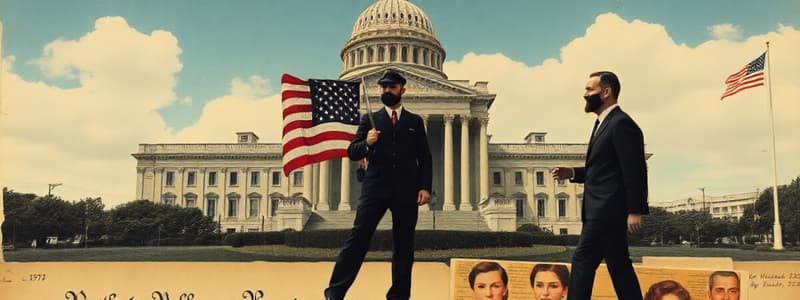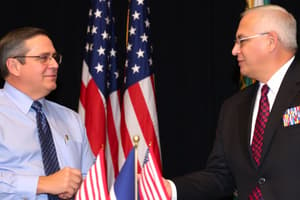Podcast
Questions and Answers
Which branch of the U.S. government has seen its foreign policy powers increase in recent years, especially since 9/11?
Which branch of the U.S. government has seen its foreign policy powers increase in recent years, especially since 9/11?
- The House of Representatives
- The Senate
- The Executive Branch (correct)
- The Judicial Branch
What key challenge was highlighted by the Articles of Confederation regarding the new United States?
What key challenge was highlighted by the Articles of Confederation regarding the new United States?
- A strong standing army
- Excessive central authority
- Limited state sovereignty
- A unified foreign policy approach (correct)
Which concept, fundamental to U.S. ideology, was often invoked to justify westward expansion?
Which concept, fundamental to U.S. ideology, was often invoked to justify westward expansion?
- Federalism
- Expansionism (correct)
- Isolationism
- Pacifism
What was the primary purpose of the Northwest Ordinance of 1787?
What was the primary purpose of the Northwest Ordinance of 1787?
According to the provided content, what is a significant characteristic of the US Constitution regarding foreign policy powers?
According to the provided content, what is a significant characteristic of the US Constitution regarding foreign policy powers?
What was the constitutional intent behind the ambiguity in the distribution of foreign policy powers?
What was the constitutional intent behind the ambiguity in the distribution of foreign policy powers?
Which of the following is an explicit power of Congress related to foreign affairs according to the content?
Which of the following is an explicit power of Congress related to foreign affairs according to the content?
What role does the Senate play in the treaty-making process?
What role does the Senate play in the treaty-making process?
How does the content characterize the instances of institutional conflict in foreign policy?
How does the content characterize the instances of institutional conflict in foreign policy?
What did Edward S. Corwin mean when describing the Constitution as 'an invitation to struggle'?
What did Edward S. Corwin mean when describing the Constitution as 'an invitation to struggle'?
What trend does the text identify regarding international agreements?
What trend does the text identify regarding international agreements?
What was the significance of the North Atlantic Treaty (creating NATO) in terms of congressional power?
What was the significance of the North Atlantic Treaty (creating NATO) in terms of congressional power?
What was the primary intention of the War Powers Resolution of 1973?
What was the primary intention of the War Powers Resolution of 1973?
Which factor was identified as a driver influencing US foreign policy, related to the concept of 'Manifest Destiny'?
Which factor was identified as a driver influencing US foreign policy, related to the concept of 'Manifest Destiny'?
What did O'Sullivan say that describes Christian nationalist justification for expansionism?
What did O'Sullivan say that describes Christian nationalist justification for expansionism?
How did the US address the challenge of expansion regarding newly acquired territories?
How did the US address the challenge of expansion regarding newly acquired territories?
How did the Panic of 1890 influence US foreign policy?
How did the Panic of 1890 influence US foreign policy?
What role did missionaries play in the expansion of US influence in Asia?
What role did missionaries play in the expansion of US influence in Asia?
Why did the US decide to annex Hawaii in 1898?
Why did the US decide to annex Hawaii in 1898?
Which concept describes the US approach to China around 1900, aiming to avoid direct colonial control?
Which concept describes the US approach to China around 1900, aiming to avoid direct colonial control?
What was the Teller Amendment, related to the Spanish-American War?
What was the Teller Amendment, related to the Spanish-American War?
What territories did the US acquire from Spain as a result of the Treaty of Paris in 1898?
What territories did the US acquire from Spain as a result of the Treaty of Paris in 1898?
According to Alfred Mahan, what determined a country's control of world affairs?
According to Alfred Mahan, what determined a country's control of world affairs?
How did the Yellow Press contribute to the Spanish-American War?
How did the Yellow Press contribute to the Spanish-American War?
What limits were placed on Cuba's independence through the Platt Amendment of 1901?
What limits were placed on Cuba's independence through the Platt Amendment of 1901?
What was a consequence of strong independence movements in the Philippines after the Spanish-American War?
What was a consequence of strong independence movements in the Philippines after the Spanish-American War?
What was Dollar Diplomacy under President Taft?
What was Dollar Diplomacy under President Taft?
What impact did WWI have on the vision for US internationalism?
What impact did WWI have on the vision for US internationalism?
What was the key premise behind Wilson's idea of a 'community of power'?
What was the key premise behind Wilson's idea of a 'community of power'?
How did the US respond to Germany's resurgence of submarine warfare during WWI?
How did the US respond to Germany's resurgence of submarine warfare during WWI?
What was unique about the Wilsonian Solutions of 1918 regarding international relations?
What was unique about the Wilsonian Solutions of 1918 regarding international relations?
What was a major contradiction in Wilson's vision for the League of Nations?
What was a major contradiction in Wilson's vision for the League of Nations?
What characterized the 'normal internationalism' of the 1920s in the US?
What characterized the 'normal internationalism' of the 1920s in the US?
Which factor led to the plans to reduce Germany's World War I reparations?
Which factor led to the plans to reduce Germany's World War I reparations?
How have many writers described the foreign policy approach in the US from 1934-1939?
How have many writers described the foreign policy approach in the US from 1934-1939?
What was the essence of what the Nye Committee to investigate the causes of WWI?
What was the essence of what the Nye Committee to investigate the causes of WWI?
In 1940 what did the USA give to Britain?
In 1940 what did the USA give to Britain?
What was the significance of Japan attacking Pearl Harbour?
What was the significance of Japan attacking Pearl Harbour?
Following the end of the civil war what was the USA keen to do?
Following the end of the civil war what was the USA keen to do?
Flashcards
President vs. Congress
President vs. Congress
Periodic conflict between the President and Congress is an intended feature of the Constitution.
Congress's Foreign Affairs Powers
Congress's Foreign Affairs Powers
Congress has the power to regulate commerce with foreign nations, declare war, raise armies, and maintain a navy.
Presidential Power Increase
Presidential Power Increase
Presidents have acquired more foreign policy powers,especially since 9/11, overshadowing Capitol Hill during crises.
Article 2 of the Articles of Confederation
Article 2 of the Articles of Confederation
Signup and view all the flashcards
Article 3
Article 3
Signup and view all the flashcards
U.S. Constitution
U.S. Constitution
Signup and view all the flashcards
Northwest Ordinance
Northwest Ordinance
Signup and view all the flashcards
Imperialism without colonialism
Imperialism without colonialism
Signup and view all the flashcards
Federal vs. State Tension
Federal vs. State Tension
Signup and view all the flashcards
Twilight zones
Twilight zones
Signup and view all the flashcards
Constitutional Intent
Constitutional Intent
Signup and view all the flashcards
President's Treaty Power
President's Treaty Power
Signup and view all the flashcards
Congress's Foreign Policy Powers
Congress's Foreign Policy Powers
Signup and view all the flashcards
Senate's Role
Senate's Role
Signup and view all the flashcards
Edward S. Corwin's View
Edward S. Corwin's View
Signup and view all the flashcards
Congressional executive agreement
Congressional executive agreement
Signup and view all the flashcards
Sole executive agreements
Sole executive agreements
Signup and view all the flashcards
Reid V. Covert 1957
Reid V. Covert 1957
Signup and view all the flashcards
North Atlantic Treaty
North Atlantic Treaty
Signup and view all the flashcards
The constitution has been averted by finding alternatives
The constitution has been averted by finding alternatives
Signup and view all the flashcards
War Powers Resolution - 1973
War Powers Resolution - 1973
Signup and view all the flashcards
Manifest destiny
Manifest destiny
Signup and view all the flashcards
Northwest Ordinance
Northwest Ordinance
Signup and view all the flashcards
Process of expanding northwest of the republic.
Process of expanding northwest of the republic.
Signup and view all the flashcards
Madisonian Republicanism
Madisonian Republicanism
Signup and view all the flashcards
Resources and territories
Resources and territories
Signup and view all the flashcards
Nature
Nature
Signup and view all the flashcards
Native nations
Native nations
Signup and view all the flashcards
Diplomacy and treaties
Diplomacy and treaties
Signup and view all the flashcards
Removal of civilized nations
Removal of civilized nations
Signup and view all the flashcards
Northwest ordinance
Northwest ordinance
Signup and view all the flashcards
vague definition
vague definition
Signup and view all the flashcards
End of frontier
End of frontier
Signup and view all the flashcards
Annexation of Hawaii:
Annexation of Hawaii:
Signup and view all the flashcards
Open door notes
Open door notes
Signup and view all the flashcards
Teller amendment
Teller amendment
Signup and view all the flashcards
Rationales of the wars
Rationales of the wars
Signup and view all the flashcards
Interdependent world
Interdependent world
Signup and view all the flashcards
Platt amendment 1901
Platt amendment 1901
Signup and view all the flashcards
Study Notes
"An Invitation to Struggle": Foreign and National Security Affairs
- The US Constitution and its many anachronisms are relevant to the oversight of foreign and national security affairs.
- Both the President and Congress possess exclusive foreign policy powers, while others are shared or not explicitly assigned by the Constitution.
- Clashes between the two branches occur especially in military operations, foreign aid, and immigration.
- Presidential power often leads over Congress due to national emergency status.
- The tug-of-war between the President and Congress over foreign policy is not an accident, but rather, one of the Constitution's core aims.
- Article I of the Constitution lists Congress's foreign affairs powers, including regulating commerce with foreign nations, declaring war, raising armies, maintaining a navy, and making rules for the armed forces.
- Congress has repeatedly barred the Obama administration from using funds to transfer detainees out of Guantanamo Bay.
- The judicial branch has limited power to arbitrate constitutional disputes over foreign policy and is often reluctant to do so.
- Presidents have increased foreign policy powers at the expense of Congress, especially since 9/11.
- During times of war or national emergency, the White House tends to overshadow Capitol Hill.
Foreign Policy Issues in the Constitutional Debate
- In 1783, the US and Britain signed a peace treaty, granting Britain's former colonies their independence
- The US became an independent, confederate state.
- Article 2 of the Articles of Confederation states that each state retains its sovereignty, freedom, and independence.
- Westward expansion was seen as a natural process.
- Article 3 of the Articles of Confederation: "a firm league of friendship with each other, for their common defense, the security of their liberties, and their mutual and general welfare".
- Independence was achieved, but unity was not, and interstate commerce was limited and unregulated.
- The new country was weak, surrounded, and threatened by Spain, France, and Britain.
- In the war of 1812, Britain burnt down the capital.
- There was a consistent fear that the West could suffer the same fate as Poland, which was partitioned.
- Britain accepted US independence because it hoped that the US would collapse and be dependent on Britain.
- Trade, economics, geopolitics, and security pushed for a new constitution giving the country the tools to prosper and survive.
- Expansionism was a fundamental element of US ideology.
- Security and prosperity are needed in order to expand
- The US Constitution is a peace treaty, equivalent to an international agreement between colonies that considered themselves sovereign.
- The Northwest Ordinance of 1787 defined and regulated how expansionist destiny was to be pursued.
- The task of expanding was costly and complicated, so the federal government managed it.
- The law divided the northwest of the Republic into 3/5 states
- The process was, 1. Appoint a governor, 2. Elect assembly of at least 5000 "free men", and 3. State constitution and request of membership once the population reached 60,000.
- If accepted, the application would place the new state on an equal footing with the others.
- Expansion would take place by a reproduction of the original model, but natives lived there settler colonialism
- Many argued that the confederacy could not pursue trading, security, and expansion goals, leading to the drafting of a new constitution.
- Anti federalists lost to the federalist papers by John Jay
- Tension between the federal government and states, especially on foreign policy issues, is still alive today.
- The 2016 case, Texas vs Obama's cancellation of Iranian sanctions demonstrates this.
- Texas VS Biden over the Mexican border exemplifies the tension.
- States have their own foreign policy and challenge the decisions of the federal government.
Explicit Foreign Policy Powers
- The Constitution is vague and basic on the distribution of power over foreign policy
- It created a new system: federal government with checks and balances and 3 main powers.
- Article 1: Congress regulates commerce and declares war
- Article 2: The President ratifies treaties and appoints diplomatic representatives.
- Congressional power is the stronger of the two
- Authority is not clearly defined (both can claim it) between Congress and the President
- Constitutional authority over foreign affairs is unprecise.
- The text is incomplete and deficient, due to the unknown future.
- The intent was to have ambiguity to prevent a single authority from having a full monopoly over a given issue.
- The President is constitutionally weak.
- The system is not conducive for efficient policy making.
Powers of the President
- Negotiates treaties, interprets them, and decides to terminate them, but does not have exclusionary power over that.
- Appoints ambassadors and diplomatic representatives.
- Commander in Chief: Article 2 states that the President shall be Commander in Chief of the Army, Navy, and Militia.
- Since 9/11 Presidents claim a state of perpetual war.
- Statutory authority (e.g. 1977 law) grant the power to impose economic sanctions.
- Applies laws, using that "he shall take care of that the laws be faithfully executed" to justify additional powers.
Powers of Congress
- Regulates foreign trade & policy: Granting this power to Congress underlines its role as a primary actor.
- Congress declares war (art.1).
- Congress has indirect responsibilities: allocations, immigration, norms on naturalization, "power of the purse", congressional investigations.
- The Senate ratifies treaties and appointments with a 2/3 majority.
- The President shares these powers with the advice and consent of the Senate.
Institutional Conflict on Foreign Policy
- Dual institutional conflict occurs in disputed twilight zones for appointments, treaties, and declarations of war.
- Edward S. Corwin said that the constitution is an invitation to struggle for directing US foreign policy.
- The struggle is less important when the system is less polarized.
- The more powerful the US became, the more inexorable the increase of presidential power became, making it the "sole" organ of the federal government.
- Treaties are negotiated with the advice of the Senate and ratified by a 2/3 majority.
- Treaties bind long-term commitments, while there are congressional executive agreements with a majority of the 2 chambers and sole executive agreements concluded with presidential power.
- Sole executive agreements are less likely to last without legislative approval.
- The vast majority of international agreements have been signed without the constitutional process defined by article 2 after 1930.
- Reid V. Covert 1957: supreme court ruling that the constitution supersedes international treaties and commitments, even fully ratified treaties.
- The 2015 Iranian nuclear deal could not be ratified by Congress, but went to the Senate.
- The North Atlantic Treaty created NATO: Highly controversial treaty because of art.5, collective security.
- The North Atlantic Treaty took the power to declare war away from congress if an attack on one is on all.
- The US should be obliged to go to war without a formal declaration of war by Congress.
- Congressional-executive agreements: Bretton Woods agreements (1945) or NAFTA (1993) or USMCA (2018).
- Sole executive agreements: "Destroyers for bases" (1940) (exchange btw US/UK) or COP21 (2015).
- Woodrow Wilson lost due to his proposal for the League of Nations
- Salt II & Jimmy Carter lost for the Soviet Union withdrawn
- Controversial appointments include Pete Hegseth – Secretary of Defense and John Bolton criticized the UN.
Presidential War Declarations
- The US formally declared war 5 times: 1812 - UK, 1845 - Mexico, 1898- Spain, 1917 – Germany & Austria Hungary, 1941 – the enemies.
- The constitution has been averted by finding alternatives: Vietnam (1964) & Iraq (2003) > a broad authorization to the president to use force.
- The War Powers Resolution, 1973, was Congress intended to limit the President's authority and reassert its authority, requiring a national emergency to approve the use of force without declaration.
- The text references, low intensity permanent war?
- After 9/11 - 2013: Obama's increase of drones to target and kill
US Foreign Policy Actors
- Key actors: President, Congress, special advisors, Department of state, Department of Defense, Department of homeland security, Intelligence agencies, Relevant members of congress, Governors and states govs
- The States can jump in and have done so not very often
- The cabinet & the National Security Council were established 1947
- Council: members can change from admin, and matters of national security are framed.
Manifest Destiny
- Domestic drivers had a big influence on foreign policy making
- 1776 1803: Consolidation republic and definition of its nature (Northwest Ordinance)
- From the declaration of independence to the Louisiana purchase
- The Northwestern Ordinance regulated expansionism, based on the assumption the territories incorporated into the union would become full members.
- There was imperialism, but not colonialism.
- Jefferson spoke of an unlimited expansion, and an American empire.
Louisiana purchase and drive to the West 1803 - 1819
- Phase, Expansion west
- Phase 2, purchase of Louisiana from France > negotiation was about navigation rights on the river (efficient ways of transporting goods and people)
- Controlling the Mississippi or the right to navigate was vital for any expansionist dream and project of survival of the republic.
- The territory was sold to the US, doubling the size of its national territory (mapping)
- Process completed w/ Adam Onis treaty 1819: traced a new border w/ New Spain / Mexico
- continental empire/republic, 1819 - 1845
- Drove West: Pb was to populate and organize its territories (Texas became independent until its annexation in 45)
- to the end of the frontier", 1845 - 1898, 1846-48: Mexican American war.
- Texas's annexation in 1845, which Mexico still considered its territory (refused to recognize the treaties of Velasco).
- Mexican session '48 + Gadsden Purchase '53: lost 1 half of its territory – US gained 1/3rd
- The purchase of Alaska from Russia was contested by some
- How to connect the territories, integrate the country to create a single market drives US economic growth
- Pacific expansion annexed a network of islands/outpost naval bases (also commercial bases).
- Expanding meant organizing and preparing the process of inclusion of those new annexed territories (map) as states to create a single national market
- Alaska – 1959
Causes / Drivers of Madisonian Republicanism
- The Ideology of Madisonian Republicanism, explicitly expansionist, to extend the sphere in 1787
- Larger republic with diversity reduces the risk of being threatened- expansionism as a key means to strengthen the republic.
- Trump: Canada, Greenland, Gulf of Mexico (maps stretching from the Arctic to Panama)
- Expanding increases security by removing threats today – arctic – Russia and China today as with Poland.
- Christian nationalism and destiny way too “Manifest”
- O'Sullivan: Christian nationalist justification is to overspread the continent allotted by Providence
- God invested in the mission civilisatrice.
- Resources and territories in the waterways help the expansion
- Land's “hunger” and demographic pressures are expansionist
- Demographic and immigration lead to 15% of the US population was foreign born (1910).
- Although boom in the 20th century, immigration acts blocked the immigration (Chinese exclusion act)
- Imperials controlled maps as expansive prerequisites
- Lewis and Clark expedition mapped Louisiana
- Railways went through the mountains, killing the Chinese working the railroads.
Foreign Powers and Sectional Divisions
- Britain, Spain, Mexico, and Native nations
- The Populated north of America was an imperialism
- diplomacy than violently, Reservations
- precarious equilibrium, free states and slave states.
- balance
- The Constitution was vague
Diplomacy, Treaties, and Wars
- The Majority of treaties were signed with native nations (over European powers)
- carried out as foreign territories, foreign policy > federal gov is in charge
- the Civilized became slavists, drafted constitution
- Vioslently and include
- wars against native nations, 1845 was remval
- Indian r, Congree US serttle
- Georgia, no sovereign. US as guardian
- of Teafs Violated, Deportations to exermination.
- assimilation/
- W when US and some beieve, gen. As and de were by exterminaiton
Global Hegemony
- European stability for Pax system US. access to the provided key structural preconditions
- expansionism? ordianncae to become states propertied men) rights.
- rights
- and V violence
- and US
- warrs in
- not
Settler and Colonial
- Affairs, and to s stronger
- and domestic issues
- and war
- Is
- Categories the European
- to security
The end of the “Frontier”
- The closing happened close to the year 1890
- Frontier generated a need to expand to exploit resources
- Canals were built to generate expansionism
Missionaries in China
- Missionaries were sent to China as missionaries
- Other Asian countries were targeted
- Missionaries acted as cultural agents
War Expansion
- Annexing of Hawaii for Japan
- The island act to help annex guono Open Door Notes of IMPERIALISM
- It US
- Sent COLLABORATIVE
Cuba
- object
- sugar
- sugar
- violence
- for a war
The war
- Cuba
- roosevelt
- Negro battle,
- Puerto territory
- Bases
- 1898 - of Puerto today to
The war
- the interconnnected is
Economic and Ideological motivations
- No others in CUba
- US intevention: bruratlity
- Narrative just
Reasons for decline
- The us not
- War as to loss by
- W strong and to
- to
WW! was coming
- and vision
Studying That Suits You
Use AI to generate personalized quizzes and flashcards to suit your learning preferences.




